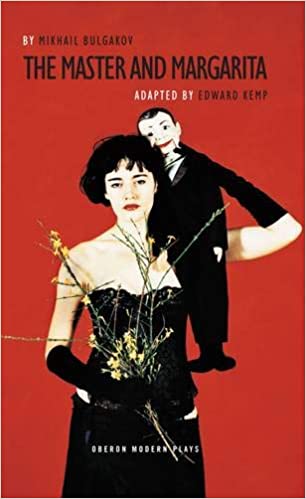The Master and Margarita - First large-scale adaptation of Bulgakov's novel in the UK, premiered at the Chichester Festival Theatre in July 2004
Crew:
Director – Steven Pimlott
Design – Alison Chitty
Movement Director - Toby Sedgwick
Lighting – Peter Mumford
Music – Jason Carr
Sound – Matt McKenzie
Magic Consultant - Tom Silburn
Cast:
The Master – Samuel West, Margarita – Clare Holman, Woland – Michael Feast, Pilate/Stravinsky - David Killick, Ivan - Jonathan Cullen, Fagott – Toby Sedgwick, Behemoth – Noma Dumezweni, Azazello - Graham Turner, Hella - Clare Foster, Berlioz - Junix Inocian, Trepan - Martin Duncan, Rimsky - Barry McCarthy, Varukha - James Loye, Andrei/Kaifa - Matt Costain, Ratslayer/Glumov/Archibaldovich - Ricky Fearon, Aloysius - Joe Anderson, Pagoda - Steve Elias, Ariman - Tom Silburn, Natasha - Daisy Haggard, Archibaldikova – Victoria McManus, Frieda/Nurse - Anna Lowe
Music:
Musicians - Ben Grove, Dan Jackson, Mark Lacey, Megan Pound, Fraser Tannock, Mark Taylor, Robert Workman
In 1983 I attended Yuri Lyubimov's sensational Meyerholdian staging of Mikhail Bulgakov's novel at Moscow's Taganka Theatre. Over 300 people filled Taganka Square clamouring for tickets. And though it's hard to imagine Chichester's lawns similarly thronged, I hope there is a stampede to see Steven Pimlott's production, which is the most innovative I have ever seen at this address.
Bulgakov's novel, published in 1967, is an extraordinary mixture of Faustian romance, anti-Stalinist satire and religious enquiry. Edward Kemp, its current adaptor, has done a first-rate job in unravelling its complex structure. He does full justice to the disruptive arrival of the Mephistophelian Woland, complete with cat and demons, in communist Moscow. He also places the Faustian Master and his adoring Margarita at the centre of the story, and it is her faith in his banned play about the confrontation of Yeshua and Pontius Pilate that becomes the source of redemption.
Kemp's transformation of Bulgakov's hero from a novelist into a dramatist makes practical sense: it means we see extracts from the Master's play, in which Yeshua subversively argues that "all authority is a form of violence against people". But Kemp also reminds us that Bulgakov's real theme is the value of creativity itself. The Master is a self-portrait of the artist as flawed seeker after truth. Margarita is inspired not just by romantic love but by a passion for the durability of art ("Manuscripts don't burn"). Even the devilish Woland becomes a symbol of the spiritual heritage from which Soviet society, and its craven literary establishment, has deliberately exiled itself.
Putting all this on stage, even with a cast of 28, requires extraordinary imagination, but Pimlott, designer Alison Chitty and magic advisor Tom Silburn triumphantly meet the text's demands. Michael Feast's gold-toothed Woland becomes a supernatural illusionist, sending vampires flying through the air. Samuel West's self-doubting Master is perfectly complemented by Clare Holman's passionately affirmative Margarita, and there is even an ironic appearance by Martin Duncan, one of Chichester's artistic triumvirate, as a malleable Soviet director. With this kaleidoscopically inventive production Chichester, once the home of safe theatre, becomes a leader of the avant-garde.– Michael Billington The Guardian
Edward Kemp's superb new adaptation - Daily Mail
Edward Kemp's new adaptation is inspired – Kate Bassett Independent on Sunday
Edward Kemp has adapted this sprawling epic with rare panache, simplifying but never diminishing it ... the whole show offers an exhilarating roller-coaster ride of violently contrasting emotions and imaginative stage effects, and you leave the theatre in no doubt that justice has been done to an apparently unstageable modern classic - Charles Spencer Daily Telegraph
